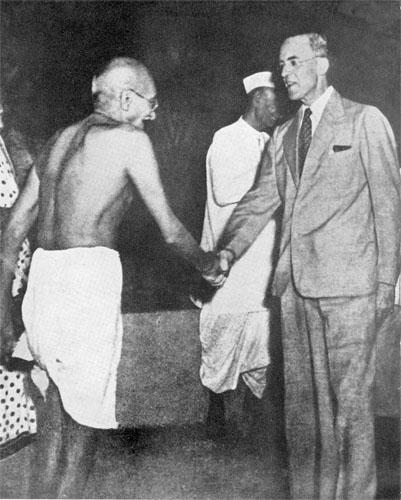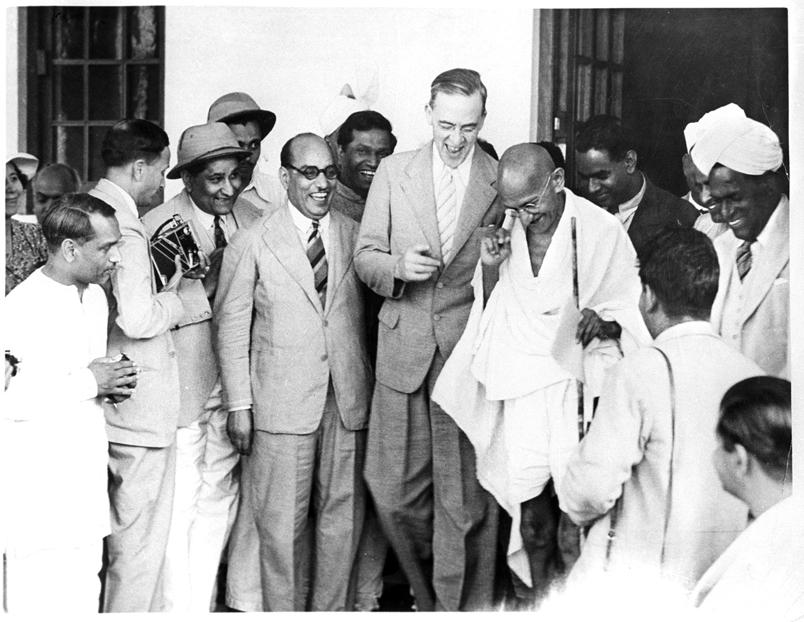Table of Contents
Cripps Mission
The British government made an unsuccessful attempt by bringing Cripps Mission in late March 1942 in an effort to win full Indian cooperation and support for their wartime endeavours. Stafford Cripps, a senior minister, served as the mission’s leader. Cripps belonged to the left-leaning Labour Party, which had historically supported Indian self-rule. However, he was also a member of the War Cabinet, a coalition led by British Prime Minister Winston Churchill, who had long led the drive to oppose Indian independence.
Cripps Mission Date & Year
Despite the conflicts of interest, US President Franklin Roosevelt’s demand had to at least appear to be taken seriously because Britain was dependent on the US for Lend-Lease supplies for the war effort, especially in light of the military catastrophes in South East Asia. Because of this, on March 9, 1942, the British government decided to send a team to India to consider its offer, and on March 22, 1942, Cripps’ plane landed in Delhi. When the war was over, the British were ready to grant India independence. Interestingly, the Lahore Resolution of 1940 celebrated its second anniversary the next day, and Cripps witnessed Muslims parading in the streets while carrying green flags. Despite having been closer to the Congress, Cripps said he was open to various viewpoints. Jinnah said that the League would reject any ideas that were not in the interests of Muslims after waiting to learn what the proposals were.

Stafford Cripps with Mahatma Gandhi
Cripps Mission Arrival in India ( kab Aaya tha)
- When Cripps first arrived in India, he spoke with Indian authorities and made ideas in an effort to appease all ethnicities.
- He tried his hardest to set up an arrangement because he was friends with Nehru. The level of mistrust, however, was too high, and many powerful individuals opposed reaching a deal.
- There is considerable misunderstanding as to what Leo Amery, the Secretary of State for India, and Churchill had given Cripps permission to offer to India’s nationalist politicians, and Cripps also encountered opposition from Viceroy Linlithgow.
- When the war was over, Cripps first offered India full dominion status with the option to leave the Commonwealth and pursue complete independence.
- In secret, Cripps also pledged to abolish Linlithgow, grant India dominion status immediately, and only insist that the Indian Defense Ministry be kept exclusively for the British.
Cripps Mission Members
The Cripps Mission, also known as the Cabinet Mission, was a delegation sent to India in 1942 during World War II by the British government to discuss and negotiate India’s future political arrangements. The mission was led by Sir Stafford Cripps, and it included several members. Here are the key members of the Cripps Mission:
- Sir Stafford Cripps: He was the head of the mission and played a central role in the negotiations. Cripps was a prominent British politician and a member of Winston Churchill’s war cabinet.
- Lord Pethick-Lawrence: He was a member of the mission and held the position of Secretary of State for India. Lord Pethick-Lawrence was responsible for presenting the mission’s proposals to Indian political leaders.
- A.V. Alexander: Alexander was another member of the mission and held the position of First Lord of the Admiralty.
- Sir John Anderson: Anderson was a member of the mission and was the Chancellor of the Exchequer in the British government.
- Sir Maurice Gwyer: Gwyer was a constitutional expert and served as the legal advisor to the mission. He played a crucial role in drafting the proposals presented to Indian leaders.
The Cripps Mission arrived in India in March 1942 and held negotiations with various Indian political leaders, including Mahatma Gandhi, Jawaharlal Nehru, and Muhammad Ali Jinnah, among others. The mission’s proposals for Indian constitutional reforms, including the offer of dominion status and the right to self-determination after the war, were met with mixed reactions and ultimately did not lead to a consensus among Indian political parties. The failure of the mission had significant implications for the future course of India’s struggle for independence.
Success of Cripps Mission
Cripps mission was a failed and unsuccessful attempt by the British Government. Cripps was tasked with brokering a deal between the nationalist Congress figures (such as Gandhi) and Muhammad Ali Jinnah and the Muslim League, who claimed to speak for the subcontinent’s Muslims. In exchange for a promise of elections and full self-government (Dominion status) after the war, Cripps attempted to keep India devoted to the British war effort. The suggestions, which Cripps himself had written, were considered with the Indian leaders before being released. The Congress turned down his suggestions and was aware that the British were negotiating from a disadvantage.
Cripps Mission and Quit India Movement
Taking advantage of the government’s weakness, the Congress working committee declared in August 1942 that if the “Quit India” appeal wasn’t accepted, the Congress would resort to civil disobedience and urge the populace to oppose and flout the law. British responded by imprisoning nearly the entire Congress leadership for the duration of the conflict. Jinnah, to whom Cripps had provided the option to reject a future union with India, joined his fellow Muslims in supporting the war effort and rose in the eyes of the British. Jinnah was “surprised” to learn that the option to withdraw from a potential marriage had been chosen.
Crips Mission
The Crips is a notorious street gang that was founded in Los Angeles, California, in the late 1960s. While it’s not accurate to describe the Crips as having a formal “mission” statement or purpose, the gang has historically been involved in criminal activities, including drug trafficking, robbery, assault, and other forms of violence.
The Crips originally formed as a neighborhood protection and community support group in response to gang violence and racial tensions in Los Angeles. Over time, however, the gang evolved into a criminal organization, and its activities have been associated with significant violence and criminality.
It’s important to note that discussing or promoting criminal organizations or activities is neither condoned nor encouraged. The Crips and similar gangs have had a detrimental impact on many communities and individuals, and their actions often lead to harm and suffering. Law enforcement agencies and community organizations work to combat gang violence and provide alternatives for at-risk individuals to steer them away from criminal involvement.
Cripps Mission in Hindi
क्रिप्स मिशन क्या था ?
ब्रिटिश सरकार ने मार्च 1942 के अंत में अपने युद्धकालीन प्रयासों के लिए पूर्ण भारतीय सहयोग और समर्थन हासिल करने के प्रयास में क्रिप्स मिशन लाकर एक असफल प्रयास किया। स्टाफ़र्ड क्रिप्स, एक वरिष्ठ मंत्री, ने मिशन के नेता के रूप में कार्य किया। क्रिप्स वामपंथी झुकाव वाली लेबर पार्टी से संबंधित थे, जिसने ऐतिहासिक रूप से भारतीय स्व-शासन का समर्थन किया था। हालांकि, वह ब्रिटिश प्रधान मंत्री विंस्टन चर्चिल के नेतृत्व वाले गठबंधन युद्ध मंत्रिमंडल के सदस्य भी थे, जिन्होंने लंबे समय तक भारतीय स्वतंत्रता का विरोध करने के अभियान का नेतृत्व किया था।
क्रिप्स मिशन वर्ष
हितों के टकराव के बावजूद, अमेरिकी राष्ट्रपति फ्रैंकलिन रूजवेल्ट की मांग को कम से कम गंभीरता से लिया जाना चाहिए था क्योंकि ब्रिटेन युद्ध के प्रयास के लिए लेंड-लीज आपूर्ति के लिए अमेरिका पर निर्भर था, विशेष रूप से दक्षिण पूर्व एशिया में सैन्य तबाही के आलोक में। इस वजह से 9 मार्च, 1942 को ब्रिटिश सरकार ने भारत के प्रस्ताव पर विचार करने के लिए एक दल भेजने का फैसला किया और 22 मार्च, 1942 को क्रिप्स का विमान दिल्ली में उतरा। जब युद्ध समाप्त हो गया, तो अंग्रेज भारत को स्वतंत्रता देने के लिए तैयार थे। दिलचस्प बात यह है कि 1940 के लाहौर संकल्प ने अगले दिन अपनी दूसरी वर्षगांठ मनाई, और क्रिप्स ने मुसलमानों को हरी झंडी दिखाते हुए सड़कों पर परेड करते देखा। कांग्रेस के करीबी होने के बावजूद, क्रिप्स ने कहा कि वे विभिन्न दृष्टिकोणों के लिए खुले थे। जिन्ना ने कहा कि लीग ऐसे किसी भी विचार को अस्वीकार कर देगी जो मुसलमानों के हित में नहीं है, यह जानने के लिए प्रतीक्षा करने के बाद कि प्रस्ताव क्या थे।
महात्मा गांधी के साथ स्टैफोर्ड क्रिप्स
भारत में क्रिप्स मिशन आगमन (कब आया था)
जब क्रिप्स पहली बार भारत पहुंचे, तो उन्होंने भारतीय अधिकारियों से बात की और सभी जातियों को खुश करने के प्रयास में विचार किए।
उन्होंने एक व्यवस्था स्थापित करने की पूरी कोशिश की क्योंकि वे नेहरू के मित्र थे। हालाँकि, अविश्वास का स्तर बहुत अधिक था, और कई शक्तिशाली व्यक्तियों ने एक सौदे तक पहुँचने का विरोध किया।
भारत के राज्य सचिव लियो अमेरी और चर्चिल ने क्रिप्स को भारत के राष्ट्रवादी राजनेताओं को क्या पेशकश करने की अनुमति दी थी, इस बारे में काफी गलतफहमी है, और क्रिप्स को वायसराय लिनलिथगो के विरोध का भी सामना करना पड़ा।
जब युद्ध समाप्त हो गया, तो क्रिप्स ने पहली बार भारत को राष्ट्रमंडल छोड़ने और पूर्ण स्वतंत्रता का पीछा करने के विकल्प के साथ पूर्ण प्रभुत्व का दर्जा देने की पेशकश की।
गुप्त रूप से, क्रिप्स ने भी लिनलिथगो को समाप्त करने, भारत को तुरंत प्रभुत्व का दर्जा देने और भारतीय रक्षा मंत्रालय को विशेष रूप से अंग्रेजों के लिए रखने पर जोर देने का संकल्प लिया।
क्रिप्स मिशन की सफलता
क्रिप्स मिशन ब्रिटिश सरकार का एक असफल और असफल प्रयास था। क्रिप्स को राष्ट्रवादी कांग्रेस के नेताओं (जैसे गांधी) और मुहम्मद अली जिन्ना और मुस्लिम लीग के बीच एक सौदा करने का काम सौंपा गया था, जो उपमहाद्वीप के मुसलमानों के लिए बोलने का दावा करता था। युद्ध के बाद चुनाव और पूर्ण स्वशासन (डोमिनियन स्थिति) के वादे के बदले में, क्रिप्स ने भारत को ब्रिटिश युद्ध प्रयासों के प्रति समर्पित रखने का प्रयास किया। क्रिप्स ने जो सुझाव स्वयं लिखे थे, उन पर रिहा होने से पहले भारतीय नेताओं के साथ विचार किया गया था। कांग्रेस ने उनके सुझावों को ठुकरा दिया और उन्हें पता था कि अंग्रेज घाटे में रहकर बातचीत कर रहे हैं।
क्रिप्स मिशन और भारत छोड़ो आंदोलन
सरकार की कमजोरी का लाभ उठाते हुए, अगस्त 1942 में कांग्रेस कार्यसमिति ने घोषणा की कि यदि “भारत छोड़ो” अपील को स्वीकार नहीं किया गया, तो कांग्रेस सविनय अवज्ञा का सहारा लेगी और जनता से विरोध करने और कानून की धज्जियां उड़ाने का आग्रह करेगी। अंग्रेजों ने संघर्ष की अवधि के लिए लगभग पूरे कांग्रेस नेतृत्व को कैद करके जवाब दिया। जिन्ना, जिन्हें क्रिप्स ने भारत के साथ भविष्य के संघ को अस्वीकार करने का विकल्प प्रदान किया था, युद्ध के प्रयासों के समर्थन में अपने साथी मुसलमानों में शामिल हो गए और अंग्रेजों की नज़रों में आ गए। जिन्ना यह जानकर “आश्चर्यचकित” थे कि संभावित विवाह से अलग होने का विकल्प चुना गया था।



 JEE Mains Result 2025 Session 2 Live: Sc...
JEE Mains Result 2025 Session 2 Live: Sc...
 UP, MP, CBSE Board Result 2025 Live Upda...
UP, MP, CBSE Board Result 2025 Live Upda...
 [Live] CUET UG Date Sheet 2025 @cuet.nta...
[Live] CUET UG Date Sheet 2025 @cuet.nta...










